Cancel Culture and the Lawful Limits of Speech | When Is the Embrace of Violence to Stop Speech Justified?
How to defend the free society when speech turns to violence
Violence as the Weapon to Stop Ideas
Violence is emerging as a response to conflicting points of view, and its subsequent celebration has sent distressing shockwaves throughout what remains of the civil order of a free society. A great disturbance in the force of nature that holds together civilization in a peaceful, cooperative manner.
What Is the Justified Response to Such Events?
How should society respond?
How does the free society defend itself without becoming just a mirror image of the monster that attacked it?
Has war now been effectively declared, and it is time to drop all principle until the enemy is vanquished?
Will the response prove to be the solution or a trap for the free republic?
There are calls to now respond in kind and to mirror the tactics of the ideological opponents of liberty. It is argued that this is necessary so as to not lose liberty to those who abide by no rules. In order to preserve the liberty of speech must we abandon its principle? Some say yes. But if that is the case, does that imply that to preserve the liberty of life we must also abandon our principles for the protection and value of life as well?
Karma, Retribution and Vengeance
When you have been egregiously wronged for a very long time, it should come as no surprise a tipping point will inevitably be reached where there is an escalation in response. Although it may be expected and understandable, it can easily result in a spiral of actions that do not advance forward any productive outcomes.
Emotional tunnel vision tends to restrict perceivable responses to that of reciprocating the actions of your adversary. A false assumption emerges that the choices are only between inaction or reciprocation.
The Methods Which Work Are Those Your Enemy Attacks
The answer should be somewhat apparent. What they wish to take from you is what they fear. They will attempt to intimidate you into stopping what is working.
Speech is the most powerful tool that has ever existed for changing minds. Therefore, speech will always be what they will desire for you to voluntarily surrender. Speech will inevitably sort out what is true and what is not when it is unimpeded and the participants’ goal is understanding.
Defining Cancel Culture: Speech and Consequence
Cancel culture has plagued online discourse for approximately a decade. It is seen as an attack on freedom of speech, but not by violation of law, but rather through cultural pressures to silence speech. Therefore, it has become somewhat insidious in nature, as without the defense of law, the recourse to combat such threats to speech have been frustrating.
Its proponents have argued that cancel culture is merely the consequence of one’s actions and therefore it is simply the ethical response to combat immoral speech.
The Attributes That Have Defined Cancel Culture
What is cancel culture precisely? Being a cultural phenomenon, it is often defined in whatever context achieves the outcome that the proponents or opponents desire. Nonetheless, let’s attempt to describe some attributes that are useful to define what consists of cancel culture behavior and its boundaries.
The stated intention of cancel culture: The intention to make environments safe from hostility. The intent to remove immoral and unethical ideologies from society.
The underlying motivations: Silence of ideological opposition. Grandiose moral superiority. Domination of preferred opinions. Speech is ineffective for social change. Unforgiveness of others. Speech can be a hostile act equivalent to violence.
The methods: Organized mobs pressure businesses, services, or platforms to remove accounts, products, or fire individuals for something they have stated.
This often involves misrepresenting the significance, interpretation, or context of something said. Furthermore, the “offended” mob typically represents themselves as a proxy for some other group for which they claim to have suffered offense or harm.
Therefore, the vocal mob is typically not even composed of users, consumers, or customers who have a relation with the company or service to which they are applying pressure to take some action against others.
The results, witch-hunts: It has been characterized by witch-hunt behavior. Broadening criteria so that more people can be canceled by an ever-growing list of “unacceptable” terms. Searching through years of history to find something objectionable in order to punish someone in the present for their difference of opinion.
Being a “witch-hunter” brings a level of status within the culture and feeds one’s moral superiority. Therefore, the more people you can cancel, the better. This incentivizes the spiraling effects where more and more normal, everyday behaviors become cancellable.
Since it establishes itself as a culture, it spreads throughout every facet of society, such as being written into company HR policies and government law. Everyone who wants to be perceived as “moral” will take part in order to not risk their livelihood. A society of silent thoughts, captured by the fear of thinking out loud.
The Rationalization of Cancel Culture: Consequence Culture
Can we simply term cancel culture as “consequence culture” and avoid any conflicts that might be perceived with free speech?
Free speech is the most fragile principle of liberty.
It readily makes hypocrites of its most ardent supporters.
In order to not be perceived as being in conflict with free speech values, many have made such arguments as the following to redefine cancel culture as consequence culture when:
Our values are correct, but theirs are not
The context is recent, not something from the past
The context is serious in nature, not simply use of a bad word
The context is about moral behavior
These arguments give us no useful criteria to evaluate speech distinctly from any other speech other than being an attempted disguise for speech we don’t like. But these are the types of rationalizations that emerge when decisions are made without any principled foundation.
Cancel Culture as a Weapon, Does It Work?
Importantly, if anyone is to choose cancel culture as a method, does it yield the desired results? Does it vanquish from society those “terrible” thoughts and those who hold them?
The important question: Who has changed their values and beliefs because they were cancelled? We haven’t observed that this outcome occurs with any frequency; however, we do see that those who were cancelled often became more defiant in their views and inevitably increased their reach.
From presidents to podcasters, and many in between, we didn’t see them crumble away to irrelevance. Instead, they inevitably surged back to prominence with an ever-greater reach and influence. How could this be termed as anything but a great failure of cancel culture?
The lesser-known individuals may have been impacted to a greater extent, resulting in them becoming a growing mass of unspoken, but importantly, unbroken thoughts and ideas. They didn’t change their minds.
It bolsters the oppositional view: Cancel culture typically fails when the cancellation did not originate from the primary consumers of the content. When it is perceived as originating from an adversarial force, the long-term result is often a bolstering of the popularity and reach of the one attempted to be cancelled.
There is no evidence that this is a useful tactic to obtain the desired results of the goal. It consists of temporary victories, but is a detriment to your cause, credibility, and often serves to inevitably bolster the counter-view.
You cannot cancel something that has an audience. Changing minds is the only method that works, but it is the long game. There are no shortcuts.
The Foundational Principles That Build Cancel Culture
Speech is ineffective: The substantial structure of cancel culture rests upon the principle that speech is ineffective for social change. Speech does not change the minds of “terrible” people. Therefore, debate and argument of your position are useless tools.
Speech is violence: Furthermore, it supposes that speech itself may consist of statements or words that are equivalent to violence when assessing the harm done.
Unforgiveness: Additionally, a sibling principle is that of unforgiveness. It fuels the justification for anything said, no matter how long ago, being as relevant as if it were said today. It also explains why apologies are always ignored even if demanded. It is not about forgiveness, but about submission and humiliation.
Force is justified: From these foundational principles, we are only left with the options of force against others as a proper response, namely to silence their speech, remove them from positions of influence, or punish them until they submit.
Removing the option of speech for conflict resolution is a disastrous step toward escalating force. As we have seen in our current society, the inevitable result of any philosophy built on top of such ideas will escalate until force becomes physical violence, which will eventually progress until fatalities result.
Culture Isn’t Contained to Only the Things You Care About
Any attempts to control speech lead to dystopian ends. Culture is not something that remains nicely contained in some box. Governments around the world are actively writing more laws restricting speech, and even those governments with the strongest speech protections have growing numbers of government officials using the nebulous term “hate speech”, which is the prelude to restrictive speech law.
When an anti-speech cultural ideology establishes itself within a society, it inevitably will permeate every facet, including powerful corporations and government. When both CEOs and government officials are aligned against speech, you have lost all lines of defense.
How Do We Recognize Cancel Culture?
Manipulative coercion: It is any manipulative attempt to silence speech without debate. Manipulative, meaning that it typically misrepresents the speech being targeted, and instead of challenging the speaker, it attacks the means by which the speaker delivers their speech. Instead of convincing the public that the speech is incorrect or not valuable, such that they disassociate of their own accord, the methods seek to prevent the delivery of the speech.
The simple essence of cancel culture is coercion versus persuasion
Unaligned and disproportionate punishment: Additionally, it often seeks punishment that is not related to the platform or topic of the speech. Such actions, for example, include attempts to terminate the speaker’s bank accounts or have them fired from positions that have no relevance to the speech. It often seeks to remove the means of one’s livelihood for a single statement that is weighed in greater proportion than the entirety of one’s life.
Anti-intellectual culture: It is cultural, as its basis is not derived from law, but originates from a collective of philosophical beliefs that cannot be defended by argument and rely on force for cohesion. It is an anti-intellectual culture that avoids ethical, reasoned debate. Therefore, it is a weak position of no confidence, which incentivizes witch-hunt behaviors as a means for dominance and to remain unchallenged.
But When Should Someone be Cancelled?
What is the legitimate criteria that should be generally considered for when someone should be cancelled, as in, fired from a job or removed from a position of authority? These questions are not precisely defined by law, as in the case of the First Amendment, but rather by the cultural response that must both defend the liberties of the free society while also defending the free society from harm.
Must You Keep Company With Enemies?
Should you be required to work alongside someone who believes it is morally acceptable to kill you for your difference of opinion? Someone who has the same moral compass as someone serving life? Nobody would find that an acceptable condition.
Additionally, should such individuals educate our children? If such viewpoints are posted publicly, we cannot say they have not entered the classroom. Children are, unfortunately, on social media and such viewpoints will be known.
However, is it possible to work alongside someone who disagrees with everything you believe, but respects you as a person and your life? Yes. This is the condition that most of us find ourselves in, knowingly or unknowingly. It might not be considered ideal, but it is not threatening.
How Do We Know?
But can we make that determination from only one sentence, absent the entirety of everything else spoken in someone’s life? The problem with witch-hunts is that they aren’t truth-seeking movements. They disregard context for anything that satisfies the mob.
Fortunately, most people aren’t the same level of monster they represent themselves as being on social media. The nature of social media engagement farming and trolling distorts the true opinions of the public.
There is also tribal signaling, where people will make outrageous statements for status within their tribe.
Responsibility
Context matters when we analyze the meanings of speech. Someone who yells, “I have a bomb” at an airport is going to have a bad day, even if they were joking.
Likewise, does a person have some responsibility if they choose to represent themselves as a terrible person and intentionally post that for the world to see? If you are posting intentions of violence in the backdrop of actual violence, expect it to be taken seriously.
Context is a determining factor of true threats. The message you are sending is one that will be received with concrete clarity. You are using an actual event of violence as the example context. Therefore, if you don’t want others to think you might enact, enable, or assist such actions, then it would be best to not use language that would imply that fact.
What Crosses the Line?
When does it cross the lines of just rhetoric? How do we know the intention stated is real? What gives us the distinction from someone just making noise? When is it the proper response to remove someone from their position, and is not simply cancel culture, which is intended to disrupt debate and punish those who have opinions we don’t like?
Once they kill you, and others then voluntarily state their alignment to that objective end, then there is no doubt. The line is crossed. Should we not believe them when they state that they wish to kill you? We now have confirmation in both action and word. There is no ambiguity or hyperbole, because the event has already happened, and they are citing it as a reference to enforce what they mean.
But What if They Speak Violence Without Intent of Violence?
But what if the individual isn’t willing to take the violent act themselves? If you so poorly represent your actual views as to infer you are violent, then expect people to respond in such a way that they consider you immoral and threatening to other’s well being.
Outrage troll posting for social media engagement must end, as otherwise, it eventually becomes acceptable. Viewpoints endlessly repeated until they become the norm. Mattias Desmet has mentioned how absurdities bind the mass together, stating “The reason why they buy into the narrative[even when absurd] is because it leads to this new social bond.” Speech is the most important defense against mass formations.
The Lawful Limits of Speech
Law does not determine unlawful speech merely by the words or expression. In order to determine the unlawful nature, the full context must be considered, as law does not criminalize words or any sequence of words standing on their own.
Congress shall make no law respecting an establishment of religion, or prohibiting the free exercise thereof; or abridging the freedom of speech, or of the press; or the right of the people peaceably to assemble, and to petition the Government for a redress of grievances.
The following describes the criteria that are used to help determine if speech is of the nature that would be considered criminal. It is an attempt to determine the serious nature of the threat and its impact.
What Qualifies Speech as a True Threat?
True threats are “statements where the speaker means to communicate a serious expression of an intent to commit an act of unlawful violence to a particular individual or group of individuals.” — Virginia v. Black, 538 U.S. 343 (2003)
The following are the types of attributes courts consider.
Speaker is describing intent for actual violence, not jokes or hyperbole.
It is specific in nature, place, time, location, and method.
The speaker must have the means and opportunity to carry out the threat as well as the intent.
Watts Factors Test:
Context of statements. Where spoken, audience, intent etc.
Reaction of the recipients. Did they perceive it as threatening or laugh because it was delivered so as to be a joke. Confirms context.
Conditional nature of the threat. Is it conditioned on only a hypothetical scenario?
What Qualifies Speech as Incitement?
Incitement is speech that is “directed to inciting or producing imminent lawless action and is likely to incite or produce such action.” — Brandenburg v. Ohio | 395 U.S. 444 (1969)
Unlike true threats, incitement is essentially the attempt to inspire violence by proxy, through other people, instead of asserting that the threat will be carried out by the speaker.
Speech is directed to producing imminent lawless action. It must be something that is about to happen, not some indefinite future event.
There must be a specific target, not abstract generalization.
The specific unlawful actions must be described.
The action must be likely to occur. This requires analysis of the context.
Culture Does Not Need to Wait for a Court Order
The lawful limits of speech are important to know, as they additionally serve as a reference of principle that attempts to preserve the liberty of speech to the fullest extent possible.
Nonetheless, the public is under no obligation to meet the strict standard of the law for voluntary association, provider of services, employment, etc., or wait for a conviction to respond to violent threats being made. However, in preserving the ethics of a free speech society, the public should attempt to make possible the conversation of all speech that isn’t advocating violence that has the appearance of true threats or incitement.
Paradox of Tolerance
Karl Popper’s Paradox of Tolerance raises the paramount question that is relevant today: How do you defend liberty against attack without either surrendering to the attacker or destroying the very thing you are trying to defend? Popper has been abused and misunderstood by both sides of the debate.
If you want deeper clarity on the topics discussed here, I highly recommend continuing with this analysis of the Paradox of Tolerance. It reveals how false definitions of tolerance have allowed tyranny to enter the gates of the free society unabated. Redefine tolerance, and we just might save liberty.
The Rubicon Portal - Don’t Panic!
Cultural Courage recently wrote a great piece examining the current troubling state of the world and asking what our role is in responding to violent events that attack the free society. Most importantly, we must find the state of mind that can reveal meaningful paths that will take us where we need to go, versus reactionary actions that would only serve our current emotional turmoil.
“If we merely react, allowing ourselves to be triggered and ignore these facets that comprise our strength and resilience in this one life, we lose. That is not hesitation, it means you have prepared yourself and those you love, so you can slow time down enough as YOU THINK.”
Read the full post here:
Demand More Speech From Your Opponents
Granting speech to your enemy allows them to expose themselves, their faults, and their terrible ideology. It gives you the verifiable support for your argument. Demand more speech, but direct it by questioning, interviewing, and pursuing answers until they can no longer summon coherent words to defend their actions or views.
It also demands more of ourselves. We must be knowledgeable about the subjects for which we are advocates, but this is a win for civilization, as this is the purpose of intellectual dialogue and debate. It pushes us to improve our knowledge and challenge what is true in order to determine what is true.
If you label speech violence, that is because that is what you fear - speech. It is feared because your positions are indefensible or your knowledge is inadequate.
Fear is the signal that you are attempting to defend your indefensible position due to emotional bias, or you are attempting to defend your pride from ignorance.
Fear is the kryptonite for rational thought. Until the above can be addressed, fear will remain and answers will be out of reach of your perception.
Human Connection Is a Prerequisite for Human Caring
Everything that devalues human connection inevitably devalues life. The final destination of not caring about each other is bedlam and death. Everything that interferes with genuine human connection is the enemy of a sane, peaceful society.
The Things That Keep Us Apart
AI, tech algorithms, social media, Big Pharma, governments, and conflicting ideologies are leading to less connection and greater dehumanization across civilization. These are all instruments that interfere with how we think, associate, and communicate with each other. This has to change, or this problem will only get worse.
Only Speech Solves the False Perceptions
Much of the animosity between groups is due to the conflicting sides believing things that are not true about each other. Speech is the only solution to this problem. It is the only solution to ignorance and misunderstanding. However, in order to be successful, we need to bypass the middlemen of thought control.
The tolerant will not demand your submission.
Free speech will not demand your silence.
Free speech has been losing ground around the world. It is in a very precarious position. Missteps will set precedents with consequences. The enemies of a peaceful and free civilization could be granted no greater victory than to manipulate you into believing that speech is your enemy.
Understanding Is the First Foundation for Connection
We are losing our ability to communicate as society is conditioning our behavior to be in a constant state of confrontation. The battles are for attention instead of understanding. If we attempted to first prove that we understand our opponent’s argument instead of proving them wrong, conversations would be far more productive toward greater understanding and the advancement of ideas.
In Defense of the Free Society
Expressing the intent of violence in response to speech is unacceptable, as it leaves no recourse for conflict resolution. A society dies that accepts this type of ideology. But let them speak, so we know who they are. Ask them to elaborate, debate, and give them the opportunity to either retract and clarify hyperbole or stand by their violent intent.
Culture does not exist in the absence of advocacy. The culture of free speech is not merely the act of defending speech when it is attacked. Culture must be preemptive in that its foundational values are instilled within society before a challenge appears at your doorstep.
Canceling offenders after they have already egressed is simply bailing water for a morally collapsing society. A society that no longer values speech, liberty, and freedom is not savable. The enemies of liberty will embed their values into every institution that has influence over the development and culture of your civilization. The free society will not be saved by law, but only by the persistent and unrelenting culture of freedom that must permeate every facet of society.
The castle of lies and untruths requires force to keep its people behind the walls of deception. Speech is the greatest fear of unjust power as it eventually leads to the realignment to objective truths.
The Objective to Save the Free Society
Some will misinterpret the allowance of speech as submission or inaction to your ideological foes. However, allowing their speech could do nothing but expose the vulnerabilities of their argument, if we believe our positions are founded on correct principle and truth.
We must choose the paths that will have meaningful results, versus those that only satisfy the reactionary nature of conflict from an angry mob. Liberties are lost from the systematic and systemic capture of the society’s culture within its revered institutions. If it is to be saved, then the proper battle for the minds of liberty lies within them.
Truth Seeking and Paranoia, A Warning
A final word and warning for troubling times when many will struggle to see clearly.
Bedlam, Conspiracy, and Doubt
In the wake of dramatic events, society is often plunged into bedlam, conspiracy, and doubt about its own principles, previously held. Lost in this darkness of confusion, we are unable to read the compass that signals the way out.
In the urgency to make sense of the world, there will be attempts to explain events that will be founded on nothing more than speculation, fear, and paranoia. This cycle can viciously feed itself as it tends to give a purpose and meaning to lost individuals.
Conspiracy breeds irrational division, and engagement farmers will exploit this to their fullest advantage. Stay sane, my friends!
Mind Prison is an oasis for human thought on topics of technology, AI, and philosophy, attempting to survive amidst the dead internet. I typically spend hours to days on articles, including creating the illustrations for each.
I hope if you find them valuable and you still appreciate the creations from human beings, you will consider subscribing. Thank you!
No compass through the dark exists without hope of reaching the other side and the belief that it matters …
Updates:
2025-10-09 - Added cancel culture infographic



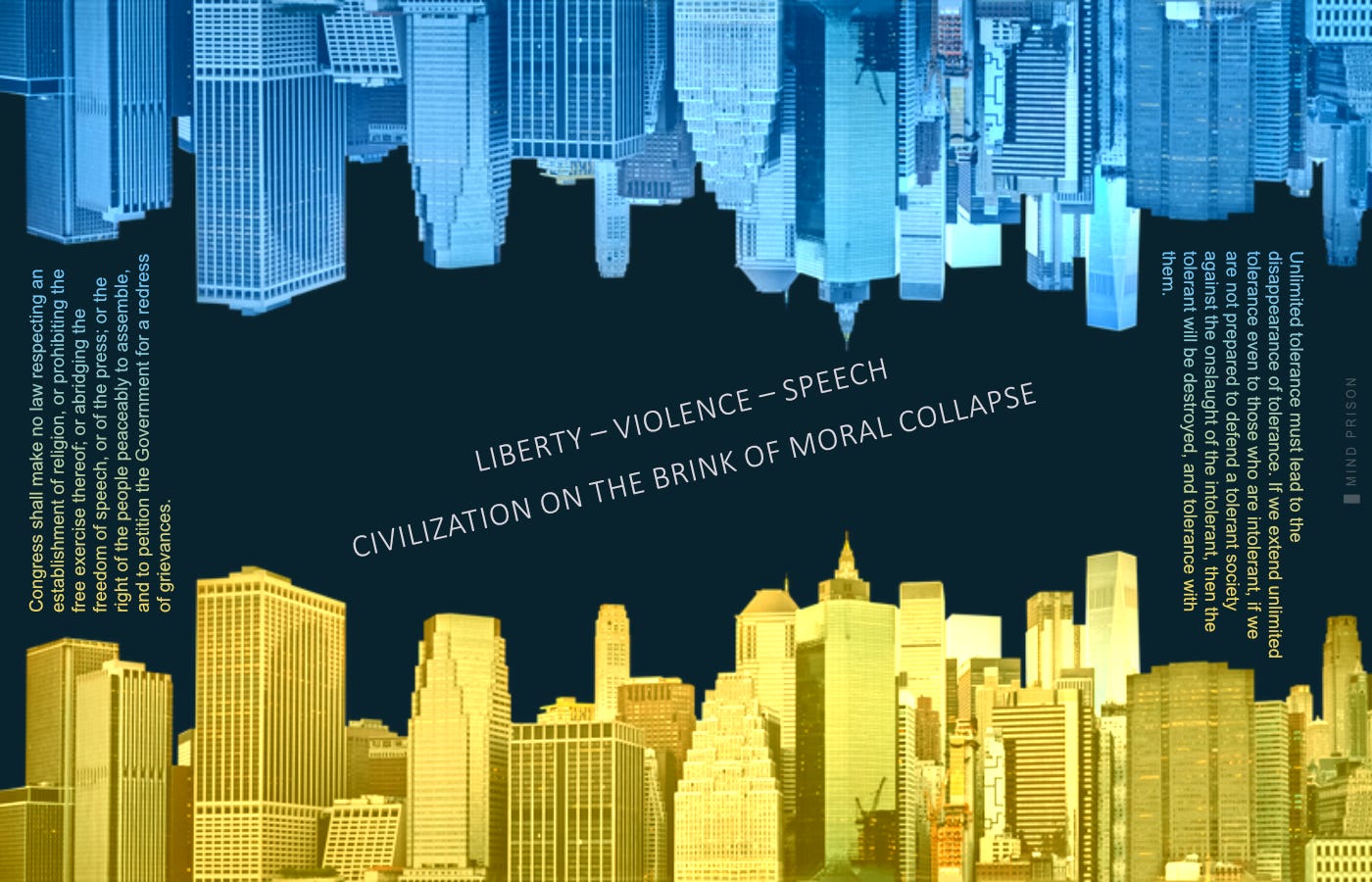
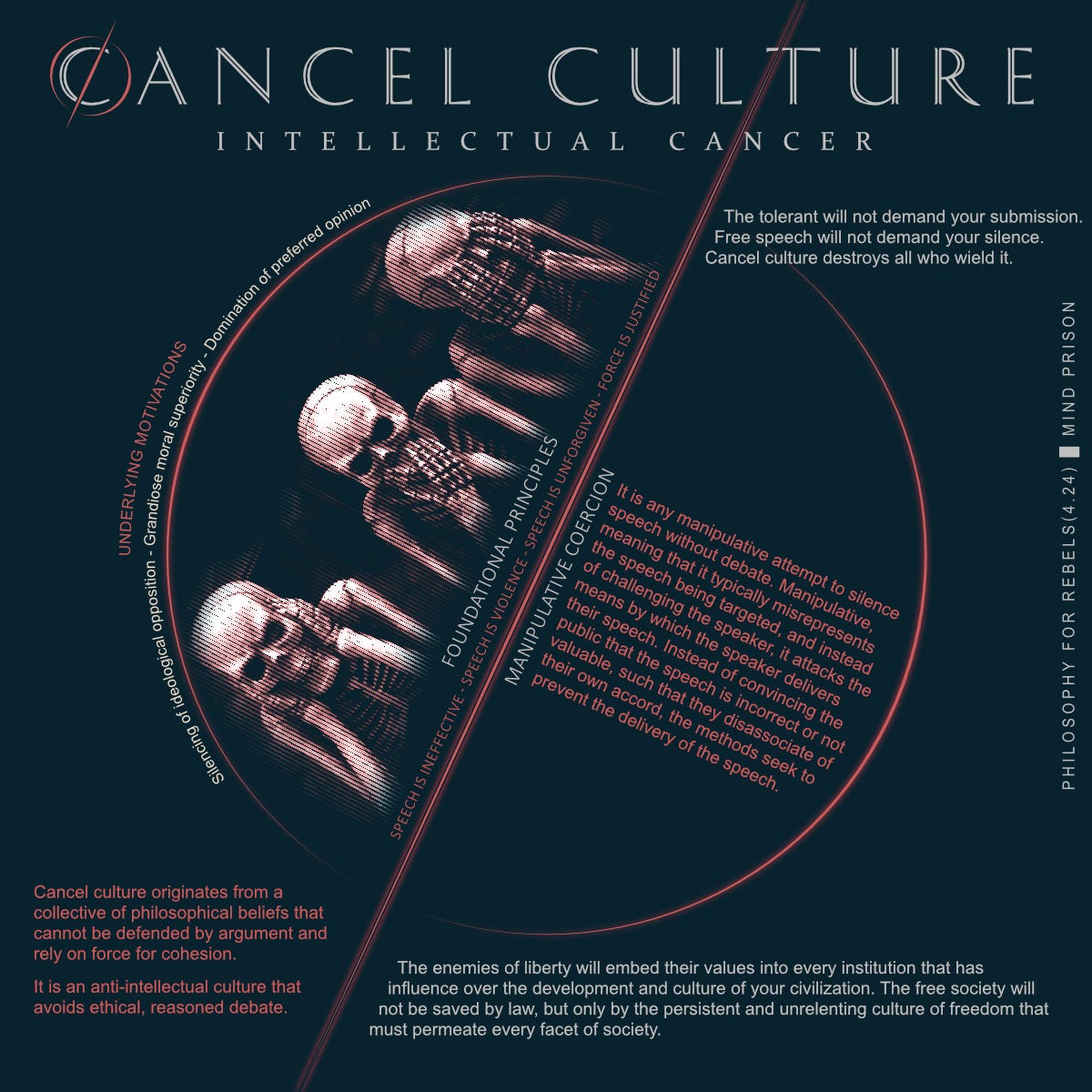
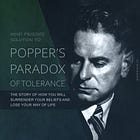

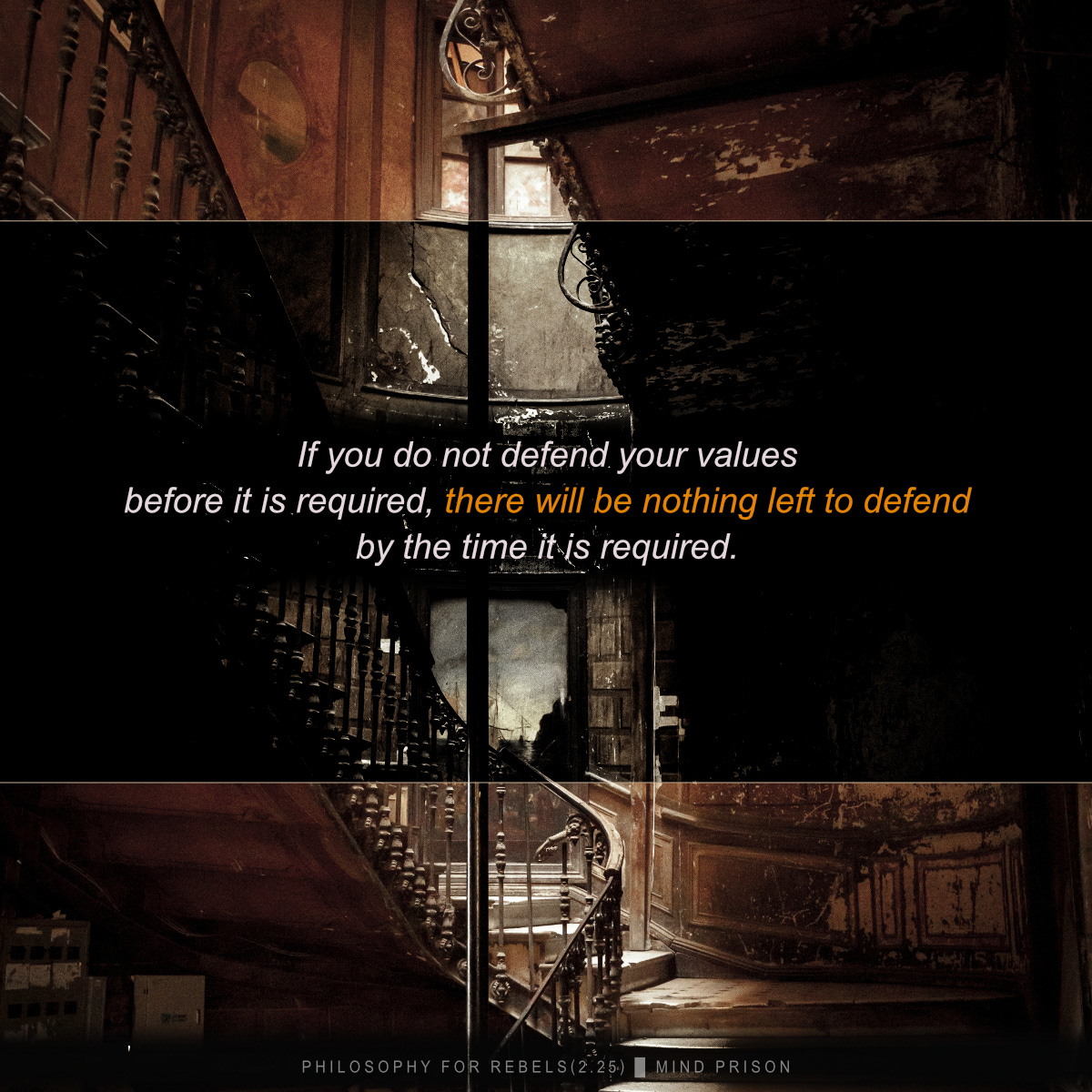
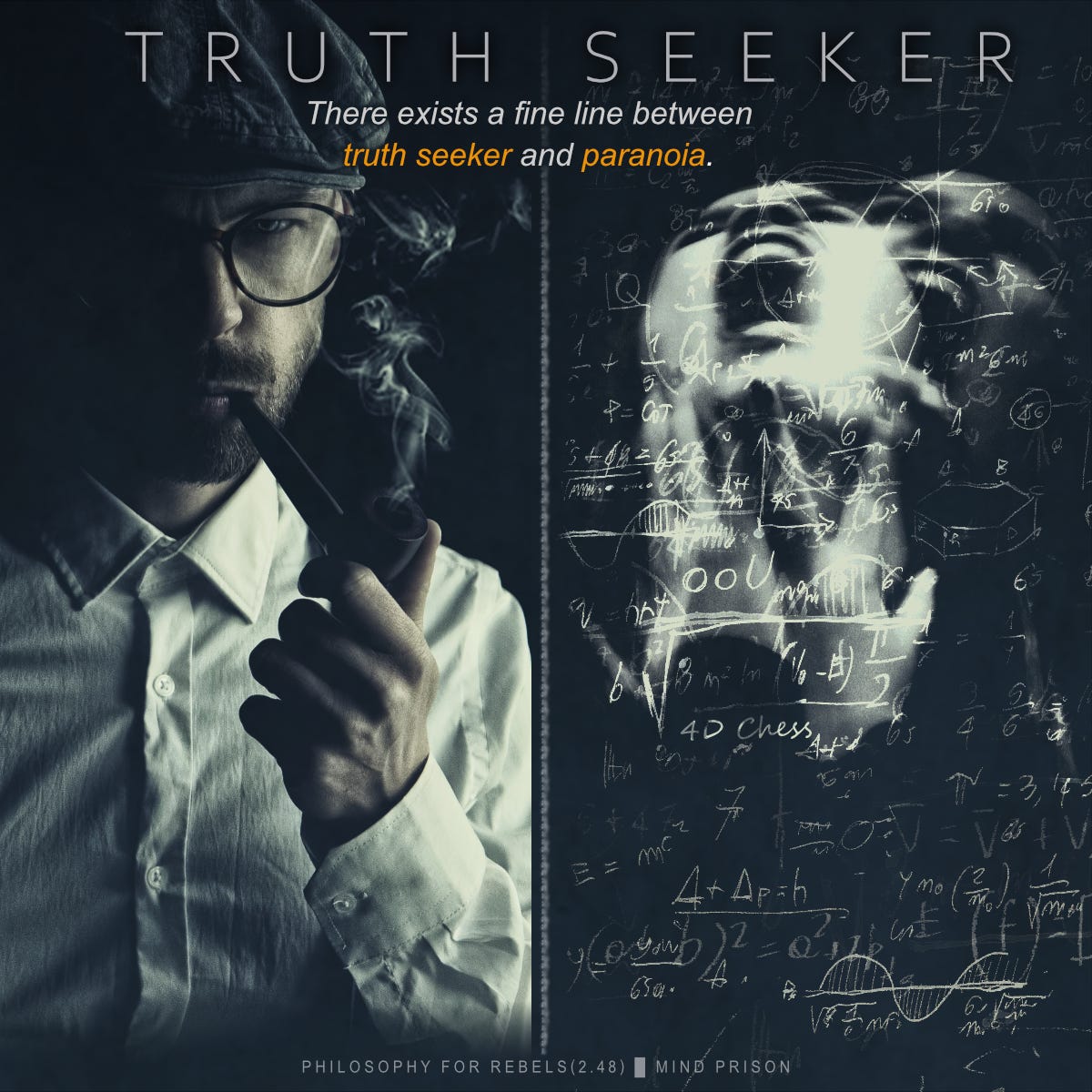
A very thoughtful examination of where we are at. Thank you so much for mentioning my article.